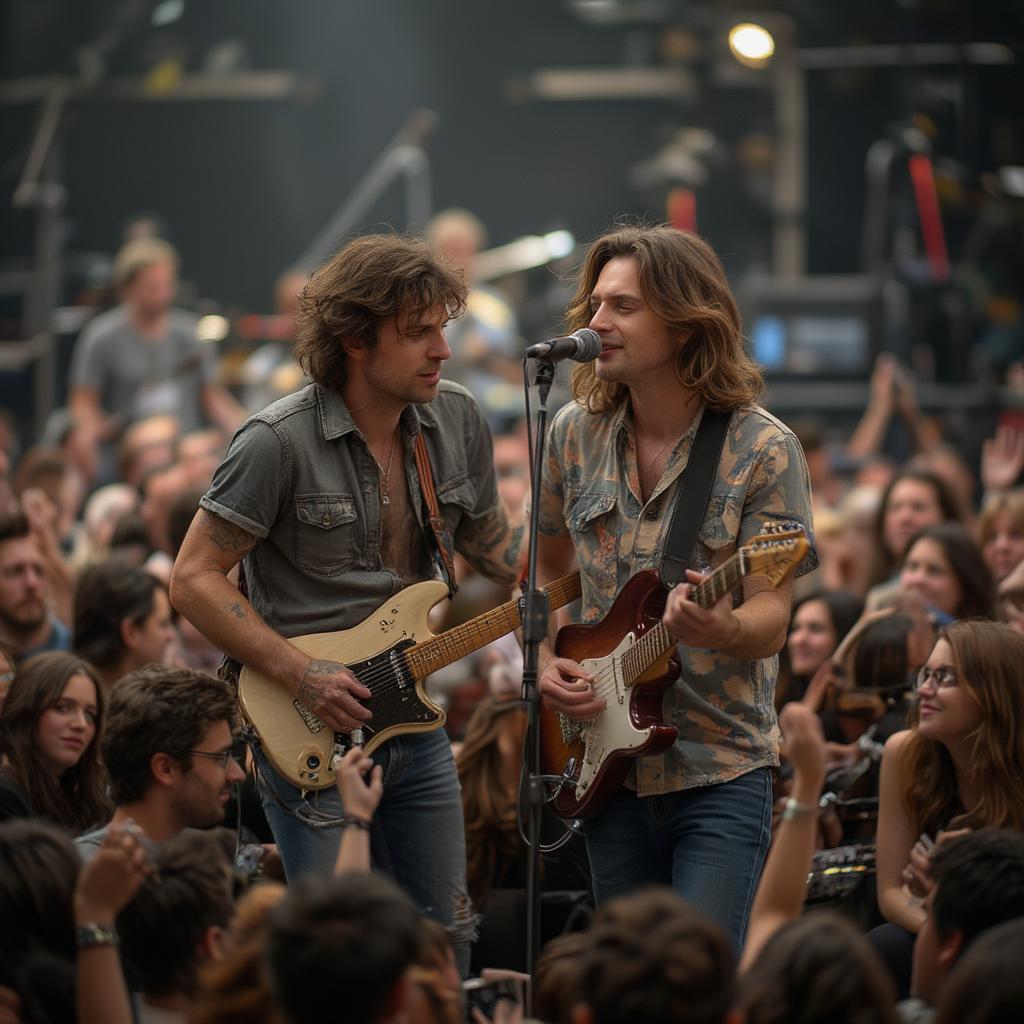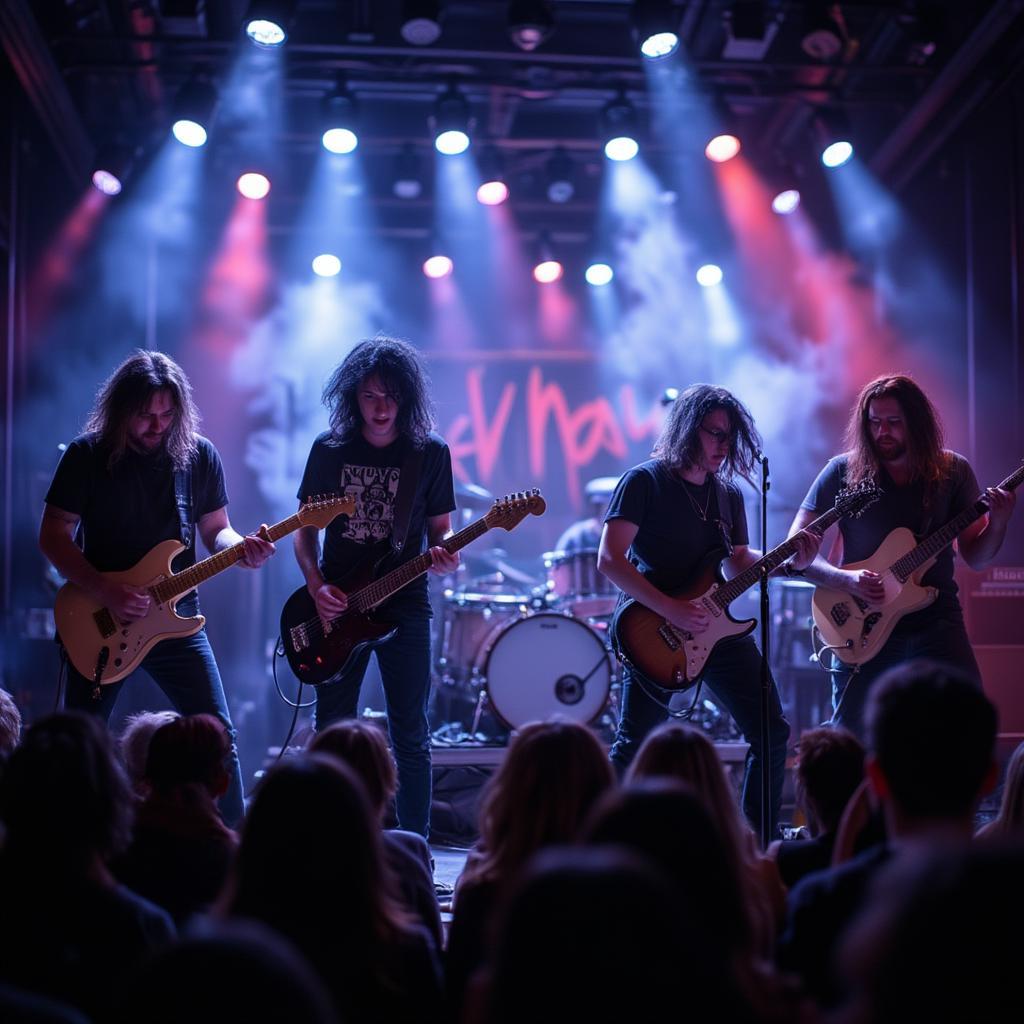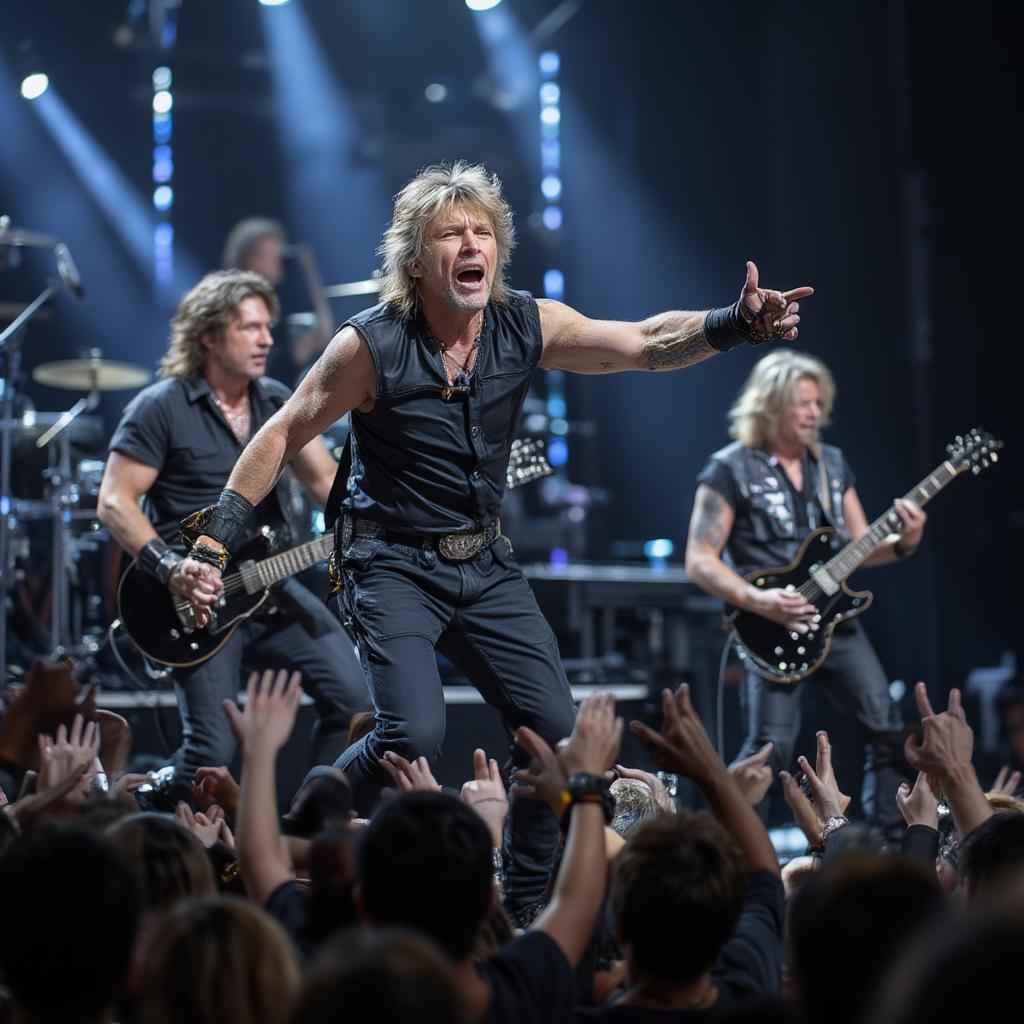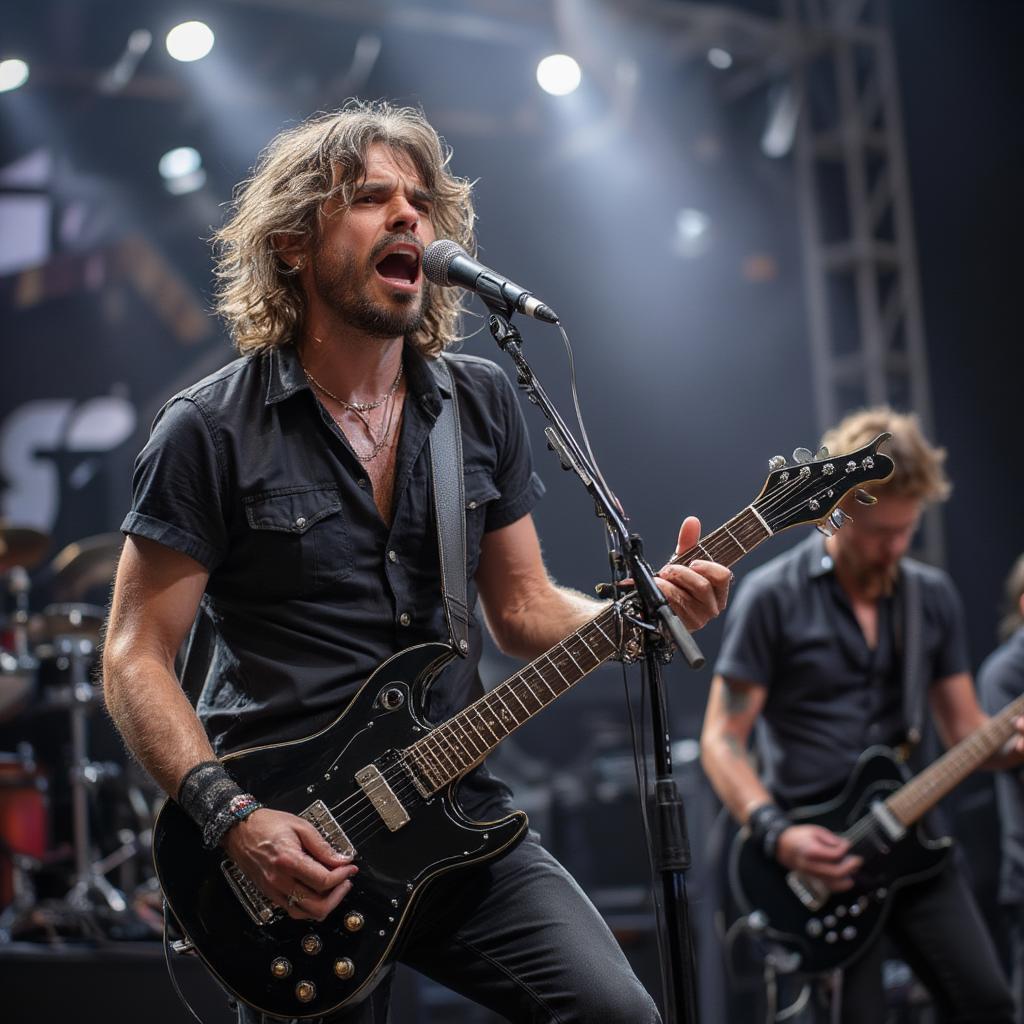Reviving the Roar: A Deep Dive into 2000s Rock Bands

The 2000s were a fascinating time for rock music, a decade that saw the genre grapple with its own legacy while simultaneously birthing fresh sounds and movements. It was an era where the raw energy of garage rock met the polished production of alternative, and where the spirit of punk found new forms of expression. For fans, these bands from the early 2000s provided a soundtrack to a generation, and their influence continues to resonate today. Let’s explore the bands that defined the sound of the 2000s and left an indelible mark on the rock landscape.
The Garage Rock Revival: Back to Basics
The early 2000s saw a resurgence of raw, stripped-down rock and roll, often referred to as the garage rock revival. Bands like the rock rap brought back the primal energy of the 60s, with distorted guitars, catchy hooks, and an emphasis on attitude. It was a reaction against the more polished sound of late 90s alternative and a call to the roots of rock music. These bands weren’t afraid to be messy, loud, and authentic, and their music resonated with a generation looking for something real.
- The Strokes: With their minimalist sound and effortlessly cool demeanor, The Strokes were the poster boys for the garage rock revival. Their debut album, Is This It, is considered a classic of the era, spawning countless imitators.
- The White Stripes: Jack and Meg White took the blues and punk and stripped it down to its bare essentials. Their raw, bluesy sound and unconventional aesthetic made them one of the most unique and influential bands of the decade.
- The Hives: Hailing from Sweden, The Hives brought a flamboyant and high-energy performance style to the garage rock scene. Their sharp suits and catchy, shout-along choruses made them a fan favorite.
Alternative Rock’s Evolution: Expanding the Sound
While garage rock dominated the early years, alternative rock continued to evolve throughout the 2000s. Bands experimented with new sounds, incorporating elements of electronic music, pop, and even progressive rock into their music. This period saw the rise of diverse acts that pushed the boundaries of the genre. These bands showcased the range of rock, proving it wasn’t just guitars and screaming, but a genre with layers and depth.
- Radiohead: While they had already established themselves in the 90s, Radiohead continued to push their sound into new territories in the 2000s, incorporating electronic textures and experimental structures into their music. Kid A and Amnesiac are prime examples of their continued innovation.
- Muse: With their operatic vocals and stadium-sized sound, Muse became one of the biggest rock bands of the decade. Their blend of classic rock influences with futuristic and theatrical elements made them a unique force.
- Coldplay: The British band became a global phenomenon with their emotional anthems and soaring melodies. Their sound, while accessible, often incorporated more complex instrumental arrangements than was standard.
The Hard Rock and Metal Scene: A Heavier Edge
The 2000s also saw a strong showing from the hard rock and metal scene. Bands like wolfmother brought back the heavy riffs and powerful vocals of classic rock, while others explored the boundaries of metal with technical prowess and extreme sounds. The bands in this genre maintained a hard and aggressive sound that resonated with fans looking for a more intense and powerful experience, proving rock was still a force to be reckoned with.
- System of a Down: With their politically charged lyrics and unique blend of metal, punk, and Armenian folk music, System of a Down were one of the most distinctive metal bands of the decade. Their music remains as relevant and powerful as ever.
- Tool: With their complex song structures and thought-provoking lyrics, Tool established themselves as a progressive metal force. Their albums are often considered masterpieces of the genre, showcasing their technical proficiency and artistic depth.
- Foo Fighters: Following their 90s grunge roots, Foo Fighters evolved into stadium rock giants, delivering hard-hitting, anthemic rock. Their consistency and stage presence solidified their legacy as a modern rock staple.
Pop-Punk’s Popularity and the Emo Movement
The early and mid-2000s witnessed a boom in pop-punk and the rise of the emo movement. Bands like Green Day (who had a mid-career resurgence), Blink-182, and Good Charlotte brought pop-infused melodies, youthful energy, and a sense of rebellion to the mainstream. Emo bands like My Chemical Romance and Dashboard Confessional explored darker themes of heartbreak, isolation, and angst, resonating with a generation grappling with identity and emotional turmoil. These bands brought a more vulnerable side to the rock scene, showing it wasn’t just about anger and rebellion.
- My Chemical Romance: They became synonymous with the emo movement, known for their theatrical performances and dark, emotional anthems. Their conceptual albums and fanbase cemented their lasting influence.
- Fall Out Boy: Known for their catchy hooks and clever lyrics, Fall Out Boy were a key band in the pop-punk scene, blending it with emo sensibilities.
- Paramore: Led by the powerful vocals of Hayley Williams, Paramore combined pop-punk and emo with a distinct female perspective, becoming a leading act in the mid-2000s music scene.
The Importance of Independent Voices: Indie Rock Bands
Alongside the mainstream sounds, the 2000s also saw the rise of a thriving independent rock scene. Bands like indie rock bands often experimented with different sounds and styles, pushing the boundaries of the genre. This era brought a more eclectic range of sounds to the forefront. It was a time when many bands could take their unique sound and bring it to the ears of fans globally, proving rock was ever-evolving.
- The Killers: With their retro-influenced sound and catchy songwriting, The Killers became one of the most successful indie rock bands of the 2000s.
- Arcade Fire: This Canadian collective brought a grand, orchestral sound to indie rock with their critically acclaimed debut, Funeral.
- Interpol: Known for their moody atmosphere and post-punk influences, Interpol brought a darker, more introspective sound to the indie rock scene.
“The early 2000s were a pivotal moment in rock history,” reflects Dr. Eleanor Vance, a musicologist specializing in rock subcultures, “we saw a return to basics, a re-evaluation of what rock could be, and the birth of diverse subgenres that continue to influence artists today.”

Where are they Now? The Legacy of 2000s Rock Bands
Many of the bands that emerged during the 2000s continue to tour and release new music today. Some have evolved their sound, while others have remained true to their roots. The lasting impact of 2000s rock is evident in the music of current artists and the continued popularity of bands from that era. They continue to inspire and influence musicians and remain relevant to their original fans and a newer generation of rock enthusiasts.
- Many 2000s bands have reunited or continued their careers into the 2010s and 2020s.
- The influence of their sounds can be heard in many modern rock and indie bands.
- Festivals continue to feature many bands from this period, showing their enduring popularity.
“The 2000s rock scene wasn’t just about the music,” notes legendary rock producer, Marcus Bellweather, “it was a cultural moment, a reaction to the trends of the past and a glimpse into the future. These bands helped shape the sounds of our times.”
The Continuing Evolution of Rock
The 2000s served as a melting pot for various rock subgenres, from the raw energy of garage rock to the emotional depth of emo and the technical prowess of metal. This decade’s sound, along with punk rock bands, was a reaction to the 90s, a revival of classic rock sounds, and a step into the future. The bands mentioned are a testament to the diversity and adaptability of rock music. It’s an era worth revisiting for both its iconic sound and enduring legacy. So, next time you find yourself searching for good rock music, take a trip back to the 2000s. You won’t be disappointed.
Frequently Asked Questions About 2000s Rock Bands
-
What characterized the sound of 2000s Rock Bands?
The sound was diverse, ranging from the raw, garage-rock revival and pop-punk to the more experimental alternative rock and heavy metal. There was no single defining sound, instead, it was the culmination of the various sounds that had come before. -
Which 2000s rock bands led the garage rock revival?
Bands like The Strokes, The White Stripes, and The Hives were key in leading the garage rock revival, bringing back a raw, stripped-down sound to the mainstream. Their approach was very reminiscent of the 60s while still sounding fresh. -
How did alternative rock evolve in the 2000s?
Alternative rock in the 2000s became more experimental, incorporating electronic elements, pop sensibilities, and even progressive rock influences, creating a wide variety of sounds. -
Who were some of the prominent bands in the 2000s hard rock and metal scene?
Bands like System of a Down, Tool, and Foo Fighters were key players in the 2000s hard rock and metal scene, each bringing a unique style and intensity to the genre. They continue to influence many artists today. -
What was the impact of the emo and pop-punk movements in the 2000s?
Emo and pop-punk bands provided a platform for teenage angst and emotional expression. They resonated with a younger audience who felt misunderstood and were looking for an outlet. -
Which independent bands defined the sound of indie rock in the 2000s?
Bands like The Killers, Arcade Fire, and Interpol were prominent indie rock bands that had a unique sound and a critical following, becoming mainstays in the festival circuit. They were known for their individual sounds and styles. -
Are many bands from the 2000s still active today?
Yes, many bands from the 2000s continue to tour and release new music, showcasing the lasting appeal of that era’s music. This is a testament to their influence and their importance in rock history. -
Where can I listen to more 2000s rock bands?
You can find playlists of these bands on streaming services such as Spotify, Apple Music and Deezer. These bands are also still played on radio stations like planet rock radio globally.




